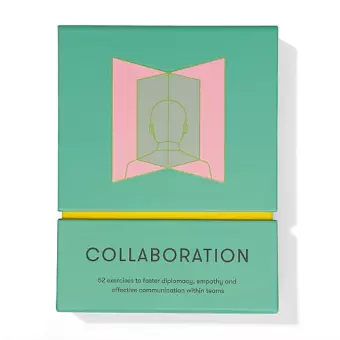Collaboration
52 exercises to foster diplomacy, empathy and effective communication within teams
Format:Cards
Publisher:The School of Life Press
Published:4th Feb '21
Should be back in stock very soon

The aim of Collaboration is to break down barriers between team members and to create an optimal atmosphere for effective work. It should be used during a break from regular duties, and will feel energising and fun, while also helping to transform how teams operate.
52 exercises designed to help improve communication skills between colleagues.
The effectiveness of any organisation or business comes down to how skilled everyone is at collaborating: how well we’re able to explain ourselves, listen to others and approach challenges in a spirit of good will and pragmatism. Luckily, we don’t have to be born with collaborative skills; they can be taught, mastered and regularly rehearsed. With the right tools to hand, we can harmonise diverse backgrounds and thinking styles and end up working fruitfully with people of very different personalities.
Collaboration is a tool for helping people work together better: 52 exercises designed to build empathy, insight and trust between colleagues. Intended to transform the atmosphere in teams, it prompts people to participate in a range of tasks and thinking exercises that strengthen their ability to cooperate and lend them insight into how others’ minds work. In a playful and often entertaining way, this toolkit aims to achieve something critical: the creation of a team that can work seamlessly and imaginatively together.
Examples
Strength Appraisal
Everyone should write down what they see as the key strength of every other member of the team (for example, that they’re empathetic, organised or tenacious). Then, going around the room, every team member should have their perceived strengths read out to them. Look out for any common themes that emerge and think about how the wider team’s perceptions might differ from your own.
UnscrewingScrew-Ups
Take it in turns to share the biggest mistake you’ve made at work – for example, deleting the file for an important presentation, placing an expensive order for the wrong type of printer ink, or forgetting the name of a major client during a meeting. Let the team suggest what lessons might be learned from the screw-up, and how the experience might have been beneficial in the long run.
ISBN: 9781915087584
Dimensions: 155mm x 115mm x 35mm
Weight: unknown
52 pages